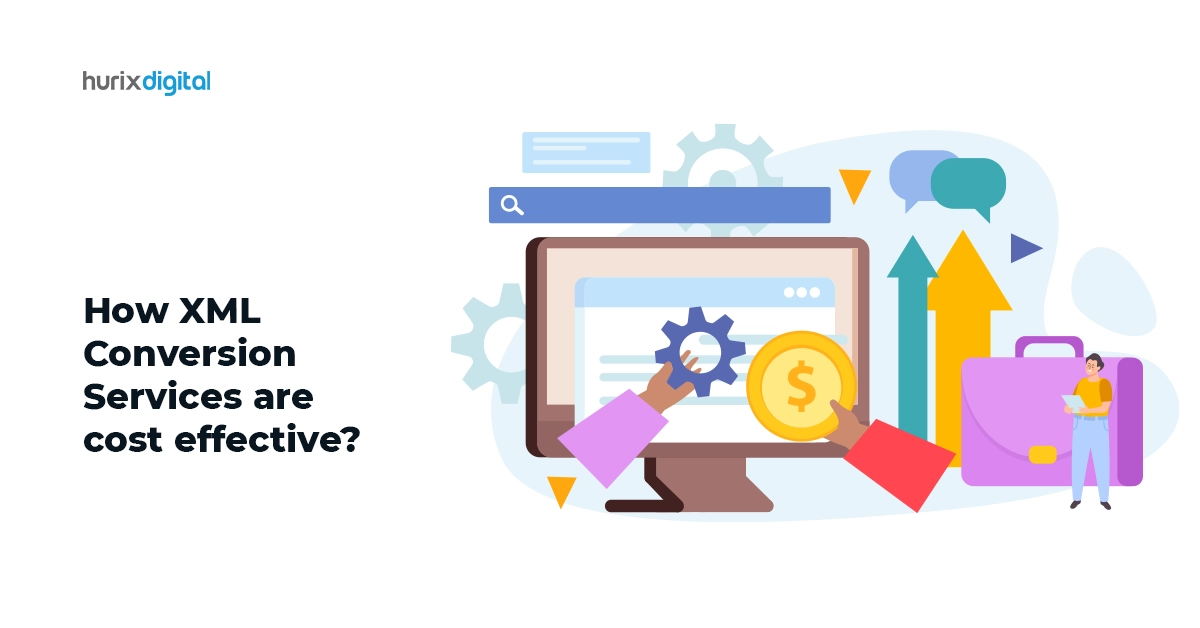How XML Conversion Services are Cost Effective?
In today’s digital world, organizations deal with a massive amount of data on a daily basis. With data coming from multiple sources and in different formats like PDF, Word, Excel etc., efficiently managing and utilizing the data becomes a challenge. This is where XML conversion services come into play.
XML conversions allow you to convert documents in various formats, but why opt for XML format specifically? Let’s look at some of the key benefits of XML format and how XML conversion services can prove to be cost-effective for your business.
Table of Contents:
- What are the Five Benefits of XML Format?
- How XML Conversion Services are Cost Effective?
- Step-by-Step XML Conversion Process
- Six Key Points to Consider When Selecting an XML Conversion Partner
- Conclusion
What are the Five Benefits of XML Format?
- Structured Data: The XML format structures your data in a standardized, organized manner with proper tags and attributes. This makes it easier to search, store, and retrieve specific data.
- System Independent: XML data is system-independent and can be used across various applications and platforms. You don’t have to worry about compatibility issues.
- Self-Describing: XML is a self-describing format. The tags provide context and indicate the meaning of data.
- Extensible: You can extend the XML vocabulary by creating custom tags as per your requirements. This provides flexibility.
- Validation: XML data can be validated against schema to ensure accuracy and consistency.
Also Read: The Comprehensive Guide to Great Content Conversion Services and Why They’re Beneficial
How XML Conversion Services are Cost Effective?
Opting for XML conversion services can help you leverage these benefits in a cost-effective manner:
1. Eliminates Manual Data Entry
Manually converting a large number of documents into XML can be extremely time-consuming and error-prone. XML conversion services automate this process for you. They use advanced conversion tools to quickly and accurately convert files at scale. This saves you a lot of time and effort.
2. Access and Utilization of Legacy Data
Many organizations have legacy data locked in old file formats like PDFs and scanned images. Converting this data into XML makes it more usable. XML data can be easily searched, processed, and analyzed. This unlocks value from existing legacy data.
3. Flexible Data Integration
Integrating data from diverse systems can be challenging. XML’s standardized format enables seamless integration of data from multiple sources – databases, emails, ERPs, etc. This simplified integration capability brings down costs.
4. Multi-Channel Publishing
XML-based publishing helps you repurpose content and publish it across multiple channels. For instance, web content from XML can also be used to auto-generate mobile apps, eBooks, online help, and more. This avoids content duplication across channels.
5. Long Term Preservation
Paper documents deteriorate over time. Converting documents like legal agreements, certificates, etc. into XML format preserves them digitally for long-term access. XML is standardized and future-proof.
6. Regulatory Compliance
Industries like Healthcare, Financial Services and Legal require strict regulatory compliance for data formats used. XML allows the creation of data as per compliance guidelines in relevant verticals. This avoids penalties and legal issues.
Step-by-Step XML Conversion Process
So how exactly are your documents converted into XML format? Here’s a quick look at a typical XML conversion process
- Document Analysis: First, your documents are analyzed to identify the structure, fields, and metadata that need to be captured.
- Conversion Rules: Based on the analysis, conversion rules are configured to map document elements to XML tags and fields.
- Automated Conversion: The conversion rules are applied to automate the conversion of your files to XML format at scale.
- Validation & QC: The converted XML documents are validated against schema and thoroughly reviewed for accuracy.
- Delivery: Once validated, the XML files are delivered to you and can be integrated into your systems.
Six Key Points to Consider When Selecting an XML Conversion Partner
When opting for an XML conversion partner, ensure that they have:
- Advanced conversion tools to automate bulk conversion
- Expertise across diverse file formats and types of documents
- A customizable conversion approach as per your specific needs
- A rigorous quality control process
- Secure infrastructure to protect your documents
- Flexible delivery options for the converted XML output
Also Read: Why Epub is Better Than PDF: Benefits of Epub Conversion
Conclusion
In conclusion, XML conversion services provide immense value by converting your legacy data into future-proof and system-agnostic XML format. They enable faster access to data, flexible publishing, simplified integration, long-term preservation, and compliance adherence in a cost-effective manner.
Hurix Digital with its deep expertise in document management and rich technical capabilities, is perfectly positioned to be your XML conversion partner. Get in touch with them today to experience the benefits of XML conversion!

Gokulnath B is the Associate Vice President – Editorial Services. He is PMP, CSM, and CPACC certified and has 20+ years of experience in Project Management, Delivery Management, and managing the Offshore Development Centre (ODC).









